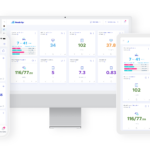Can you name a famous football player?
What about a Real Housewife?
Now, can you name your blood type?
If you answered “no,” you have a problem. Knowing your blood type can come in handy — to say the least — in a variety of situations.
The Benefits of Knowing Your Blood Type
-
Emergency preparation:
Not all blood types are compatible when donating or receiving blood. And, blood type is inherited, so that’s why it’s important to determine blood types for the entire family. Knowing which family member you can give or receive blood from during an emergency could mean the difference between life and death. If any family members have a rare blood type, you might even consider banking some of your own blood for emergency situations.
-
Susceptibility to diseases:
Some blood types are at higher risk for certain diseases. For example, people with the AB blood type have a higher risk of heart disease and people with the O blood type are more prone to retain stress hormones in their system. So knowing your blood type can be a valuable piece of data to help you assess your own risk factors.
-
Helping others
According to the Red Cross, every two seconds someone in the U.S. needs blood. Two seconds! Donating blood can help save the lives of others. Hospitals are usually low on type O (the most common) as well as O- (the universal donor). If more people knew their blood type in an emergency, hospitals could make better use of their reserves without always having to resort to O- for emergency transfusions.
How to determine your blood type:
- Ask your doctor during your next visit:
If they don’t have this information on file already, they can order the appropriate test for you.
- Do it yourself:
There are numerous options to order your own blood tests online without having to go through a doctor. Here’s one example from Request a Test.
How to update your Heads Up Health profile:
Navigate to the “Profile” section and update your blood type in the top left tile.
Important: Be sure to also upload a copy of the report from the lab into the “File” section. In many cases, doctors will want to see the actual lab report so they can be certain about your blood type before taking any action.
Here’s a quick video tutorial that summarizes what we’ve covered here.
If you’re ready to add your blood type to Heads Up Health, head over to our website and get started. Or if you just want the latest from Heads Up Health, follow us on Facebook or Twitter.
Questions? Shoot us an email. We’re here to help!






















